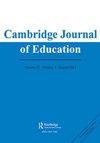数据,绩效和对教师信任的侵蚀
IF 1.5
3区 教育学
Q2 EDUCATION & EDUCATIONAL RESEARCH
引用次数: 12
摘要
摘要本文探讨了在绩效问责制和简化数据驱动逻辑的全球化趋势下,对教师专业判断的信任是如何重构的。本文借鉴了对教师和学校领导的访谈以及对教师准备日、课堂和工作人员专业学习社区(plc)的观察的实证研究,作为对昆士兰州两所地理和背景相关的公立学校的教育实践的更大研究的一部分。本文将重点关注当前如何理解和部署数据所包含的社会政治、物质经济和文化话语条件,以及这些条件如何限制对教师的信任,贬低教师自己的专业判断。具体来说,我们指出了限制信任的做法和条件是如何体现在a)确保教师持续生成和收集数据以证实其对学生学习的主张的压力,以及b)家长之间的不信任以及随后需要在“确凿证据”的基础上证明决策的合理性。本文章由计算机程序翻译,如有差异,请以英文原文为准。
Data, performativity and the erosion of trust in teachers
ABSTRACT This paper explores how trust in teacher professional judgment has been reconstituted through the globalised trends of performative accountability and reductive data-driven logics. The article draws upon empirical research from interviews with teachers and school leaders as well as observations of teacher preparation days, classroom and staff professional learning communities (PLCs), as part of a larger study of schooling practices in two geographically and contextually bound Queensland public schools. The paper focuses attention upon the socio-political, material-economic and cultural-discursive conditions inscribed in how data are currently understood and deployed, and how these conditions constrain trust in teachers, devaluing teachers’ own professional judgment. Specifically, we flag how the practices and conditions that constrained trust were manifest in a) pressures to ensure teachers generated and collected data on an ongoing basis to substantiate their claims about student learning, and b) a perceived mistrust amongst parents and a subsequent need to justify decision-making on the basis of ‘hard evidence’.
求助全文
通过发布文献求助,成功后即可免费获取论文全文。
去求助
来源期刊

Cambridge Journal of Education
EDUCATION & EDUCATIONAL RESEARCH-
CiteScore
5.30
自引率
4.30%
发文量
35
期刊介绍:
Cambridge Journal of Education publishes original refereed articles on all aspects of education, with a particular emphasis on work that contributes to a shared understanding amongst academic researchers, theorists, practising teachers, policy-makers and educational administrators. The journal also welcomes the submission of systematic review articles that summarise and offer new insights into specific areas of educational concern. With a wide international readership, Cambridge Journal of Education publishes contributions drawn from different educational systems and cultures enabling continued in-depth discussion of global educational theory, policy and practice. The journal’s Special Issue programme encourages and stimulates focused discussion and engagement with significant themes and responses to topics raised by readers and contributors. Cambridge Journal of Education welcomes proposals for future editions.
 求助内容:
求助内容: 应助结果提醒方式:
应助结果提醒方式:


